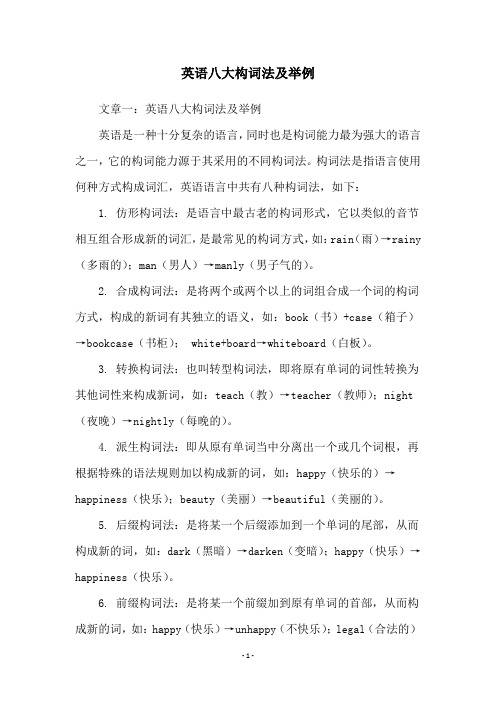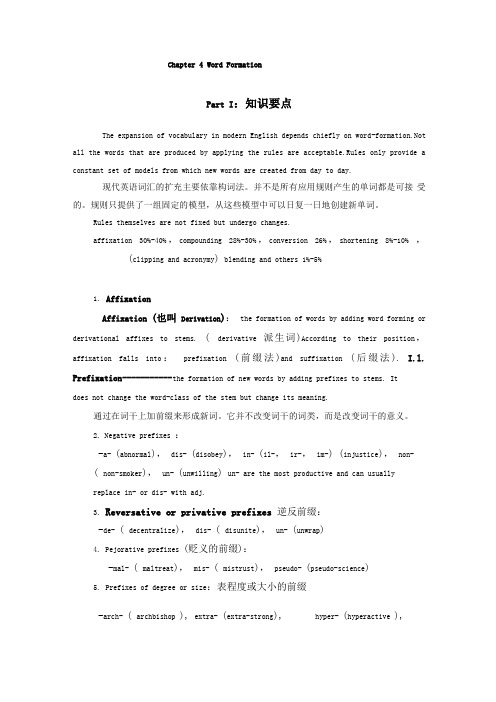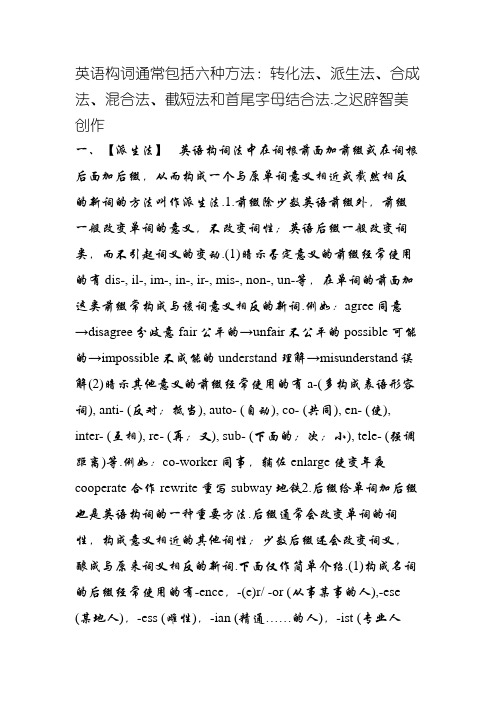英语构词法详解及练习
考研英语基础构词法练习及答案详解

1.表示否定或反义的常用词缀:
反
义
否
定
反
义
否
定
前
缀
前
缀
位置
意义
例词
a-
an-
not,without否定
apo1itical不关心政治的;
anonymous匿名的,无名的,不知名的
ab-
away from
abnormal非正常的;
a-
ab-
abs-
在“t”“v”之前
avoid避免
abstain弃权,戒;
mal-
bad,badly恶,不良
maltreat虐待;malfunction机能失常;
malcontent不满的;malnutrition营养不良;
maladminister对……管理不善
mis-
bad,badly错,坏
mistake错误
non-
not否定
nonmetal非金属;
non-ferrous非铁的;
fore-
before前.预先
foremost最前的;
forecast预测;
forefather前人,祖先;
forehead前额;
foretell预言;
foreground前景;
foresee预见
pre-
before之前
prehistory史前:
prerequisite先决条件;
prelude序言前奏曲;pre-election大选前;
半
demigod半神半人;
hemicycle半圆形建筑
semiautomatic半自动的;semimechanized半机械化的
英语构词法讲解及相关练习

英语构词法讲解及相关练习⾼中英语构词法讲解与练习在英语中,词的构成⽅式主要有三种:派⽣、合成、和转化。
⼀、派⽣Derivation注意:-ese, -ian, -ist 既可以构成名词,⼜可以构成形容词。
⽅式:1. 直接写在⼀起。
2. ⽤连字符(-)连接。
3. 由两个分开的词构成。
(5)合成代词whoever,, whatever, everyone, nobody, myself, something, anything,三、转化Conversion: 指⼀个词不变化词形,⽽由⼀种此类转化为另⼀种词类或⼏种词类。
1. 名词和动词之间的转化telephone电话——打电话, mirror镜⼦——像镜⼦⼀样反映, drink喝——饮料, record录⾳——记录, name, date, hand, study,2. 形容词转化为动词perfect完美的——使完善3.名词转化为形容词(副词) front前⾯——前⾯的4.形容词转化为名词chief 主要的——⾸领巩固练习Ⅰ⽤适当的形式填空。
1. The mother didn’t know why her daughter was crying _______. (noise)2. He was one of the best _______ in yesterday’s football match. (play)3. Look! How ______ Kate is laughing! (happy)4. It snowed _____ last night and now the streets are covered with snow. (heavy)5. Edison was a great ______. During his life he had many ______. (invent)6. More and more _____ have come to visit China over these years. (foreign)7. We want _________ reasons for your failure to help. (satisfy)8. Please give me some reference work. It will ______ my task. (simple)9. The doctor said that Mary’s mother needed an _______.(operate)10. Thank you for your _________. (kind)11When in Rome, do as the _____ do. (Rome)12. The teacher was pleased with her _______. (honest)Ⅱ.单选1. That man was ________enough not to tell the manager that he would not do the job.A. careB. carefulC. carelessD. carelessness2. The soldier died for saving the child,so his________ is heavier than Mount Tai.A. dieB. deadC. diedD. death3. The three- ________chair isn’t suitable for a young child. He may fall off.A. leggingB. leggedC. legsD. leged4.When the teacher praised him for working out the maths problem,Jack looked________about at his classmates. A. proud B. proudly C. pride D. pridely5.To everyone’s ________,the girl finished the job quite well.A. satisfiedB. satisfactoryC. satisfyingD. satisfaction6.—What are you doing here?—Oh,my teacher asked me to write a passage about ________in English.—You can write________passage in English?A. 600 words;a 600-wordsB. 600-word;a 600-wordsC. 600 words;a 600-wordD. 600 words;a 600-words7. No one should enter the spot without the________of the police.A. permitB. permissionC. permittingD. permittence8. You must come with us to the police ________.Our head is waiting for you.A. headquartersB. headlineC. headmasterD. headache9.Letting that animal escape was no accident;you did it ________.A. intendB. intentionC. intentionallyD. intentional10. The shop owner welcomed all the guests with a________smile.A. practiceB. practiceC. practicalD. practiced11. My TV is out of order. Can you tell me what is the________news about Iraq War?A. latelyB. latestC. laterD. latter12. Canada is mainly an________country.A. English-speakingB. speak-EnglishC. spoken-EnglishD. English-spoken13. How________ he is! He is always acting________.He is really a ________.A. foolish;foolishly;foolB. fool;foolish;foolC. foolish;fool;foolD. foolishly;foolish;fool14. The necklace that she lost is very expensive. It’s of great ________.15. We have to learn ________technology from other countries.A. advanceB. advancingC. advantageD. advanced16. The children live in a village ________.They come here almost every day.A. nearbyB. nearC. nearlyD. near by17.You’d better give up smoking if you want to keep ________.A. healthB. healthyC. healthilyD. healthier18.________ speaking,I di dn’t do it on purpose.A. HonestlyB. HonestC. HonestyD. DishonestⅢ.根据上下⽂语境和提⽰的⾸字母,在划线处写出⼀个合适的词。
英语八大构词法及举例

英语八大构词法及举例文章一:英语八大构词法及举例英语是一种十分复杂的语言,同时也是构词能力最为强大的语言之一,它的构词能力源于其采用的不同构词法。
构词法是指语言使用何种方式构成词汇,英语语言中共有八种构词法,如下:1. 仿形构词法:是语言中最古老的构词形式,它以类似的音节相互组合形成新的词汇,是最常见的构词方式,如:rain(雨)→rainy (多雨的);man(男人)→manly(男子气的)。
2. 合成构词法:是将两个或两个以上的词组合成一个词的构词方式,构成的新词有其独立的语义,如:book(书)+case(箱子)→bookcase(书柜); white+board→whiteboard(白板)。
3. 转换构词法:也叫转型构词法,即将原有单词的词性转换为其他词性来构成新词,如:teach(教)→teacher(教师);night (夜晚)→nightly(每晚的)。
4. 派生构词法:即从原有单词当中分离出一个或几个词根,再根据特殊的语法规则加以构成新的词,如:happy(快乐的)→happiness(快乐);beauty(美丽)→beautiful(美丽的)。
5. 后缀构词法:是将某一个后缀添加到一个单词的尾部,从而构成新的词,如:dark(黑暗)→darken(变暗);happy(快乐)→happiness(快乐)。
6. 前缀构词法:是将某一个前缀加到原有单词的首部,从而构成新的词,如:happy(快乐)→unhappy(不快乐);legal(合法的)→illegal(非法的)。
7. 借词构词法:是指借用他语中的词汇作为英语词汇的来源,如:Alps(阿尔卑斯山)→kaiser(凯撒,皇帝);science(科学)→borracho(醉鬼);cafe(咖啡馆)→tortilla(玉米饼)。
8. 固定结构构词法:是指某些特定的词汇结构,如:is+形容词+enough(够)→enough(够);do+动词+the+形容词+way(方式)→dothe+形容词+way(以…方式做)。
【高一同步教程】高中英语必修4 Unit5语法:构词法讲解及练习

高中英语必修4 Unit 5语法教学案Section ⅢGrammar—构词法语法图解【探究发现】①chairman主席newspaper报纸hometown 家乡airport 机场sunrise 日出②dislike 不喜欢incorrect 不正确的unlucky 不走运的retell 复述telephone 电话③reader 读者inventor 发明家Chinese 中国人Indian 印度人artist 艺术家kindness 和蔼operation 手术④water 水/浇水dry 干的/弄干book 书籍/预订nurse 护士/护理better 更好/改善[我的发现](1) ①组中的单词是将两个单词合并在一起,形成一个新的单词。
这种构词法被称之为合成法。
(2) ②组中的单词都是在各自的词根前加了不同的前缀,如dis-,in-,un-,re-,tele-等。
(3) ③组中的单词是在各自的词根后加了不同的后缀,如-er, -or, -ese, -ian等。
(4) ②③组中单词的构词法被称之为派生法。
(5) ④组中的单词所展示的构词法被称之为转化法。
英语中词的构成方法主要有三种:合成、派生和转化。
一、合成由两个或更多的词合成一个词,有的用连字符“-”连接,有的直接写在一起,还有的由分开的两个词构成。
1.合成名词构成方式举例构成方式举例名词+名词weekend周末动词+名词postcard明信片名词+动词daybreak破晓动词-ing+名词waiting-room候车室名词+动词-ing handwriting书法形容词+名词fastfood 快餐构成方式举例构成方式举例名词+动词-ing English-speaking讲英语的形容词+名词part-time兼职的名词+动词-ed state-owned国有的形容词+动词-ing good-looking相貌好的副词+动词-ed widespread分布广的形容词+名词+-ed warm-hearted热心的构成方式举例构成方式举例形容词+名词sometimes有时副词+名词indoors在室内介词+名词alongside在一边副词+介词nearby附近4.构成方式举例代词宾格+self herself她自己himself他自己物主代词+self myself我自己yourself你自己形容词+名词anything任何东西somebody某个人5.合成动词构成方式举例名词+动词sunbathe晒太阳typewrite打字形容词+动词whitewash粉刷safeguard保卫副词+动词overthrow推翻upset使生气[名师点津](1) 合成词的复数形式通常是把前面的主体名词变复数。
构词法知识要点与练习

Chapter 4 Word FormationPart I:知识要点The expansion of vocabulary in modern English depends chiefly on word-formation.Not all the words that are produced by applying the rules are acceptable.Rules only provide a constant set of models from which new words are created from day to day.现代英语词汇的扩充主要依靠构词法。
并不是所有应用规则产生的单词都是可接受的。
规则只提供了一组固定的模型,从这些模型中可以日复一日地创建新单词。
Rules themselves are not fixed but undergo changes.affixation 30%-40%,compounding 28%-30%,conversion 26%,shortening 8%-10% ,(clipping and acronymy) blending and others 1%-5%1.AffixationAffixation (也叫Derivation):the formation of words by adding word forming or derivational affixes to stems. ( derivative 派生词)According to their position,affixation falls into:prefixation (前缀法)and suffixation (后缀法). I.l. Prefixation ----------- t he formation of new words by adding prefixes to stems. Itdoes not change the word-class of the stem but change its meaning.通过在词干上加前缀来形成新词。
英语基础知识 构词法的讲解与训练

英语基础知识构词法的讲解与训练构词法英语构词方法主要有三种:即合成法(compounding)、派生法(derivation )和转化法(conversion)。
1. 合成法:将两个或两个以上的单词合成在一起而构成的新词,叫做合成词。
如:snow-white 雪白的;day-long 整天的;overcome 克服;downstairs 在楼下2. 派生法:所谓派生,即在词根上加前缀或后缀构成另一个与原意略有变化或截然相反的词。
例:discover 发现;disagree 不同意的;nation→national 民族的,国家的;nature→natural 自然的;treatment 治疗;development 开发展3. 转化法:英语单词的词性非常活跃,名词用作动词,动词转化为名词,形容词用作动词等现象非常普遍,这种把一种词性用作另一种词性的方式就叫做词性的转化。
如:(1)有大量动词可以转化为名词,有时意思没变化。
Let me have a try. 让我试一试。
(2)名词转化为动词。
Have you booked your ticket? 你的票订好了吗?(3)一些表示某类人的名词也可做动词。
If so,we shall be badly fooled. 如果这样我们就会上大当。
(4)形容词转化为动词。
The train slowed down to half its speed. 火车速度减慢了一半。
1、合成法(1)合成形容词①名词+现在分词例:English-speaking 讲英语的,south-facing 朝南的②名词+过去分词例:man-made 人造的,water-covered 被水覆盖的③名词+形容词例:snow-white 雪白的,day-long 整天的④形容词+名词+-ed 例:warm-hearted 热情的,kind-hearted 好心肠的⑤形容词/副词+现在分词例:good-looking 好看的,funny-looking 滑稽的⑥副词+过去分词例:well-known 出名的, deep-set(眼睛)深陷的⑦副词/形容词+名词例:right-hand 右手的,full-time 专职的⑧数词+名词例:100-meter 100米的,million-pound 百万英镑的⑨数词+名词+形容词例:180-foot-high 180英寸高的,10-year-old 10岁的⑩数词+名词+-ed 例:four-footed/legged 四脚的,one-eyed 独眼龙的(2)合成名词①名词+名词例:weekend 周末,classroom 教室,bookshop 书店②形容词/介词+名词例:gentleman 绅士,loudspeaker 扬声器③动词+名词例:typewriter 打字机,cookbook 烹调书④名词+动词例:daybreak 破晓,toothpick 牙签⑤动词-ing形式+名词例:reading-room 阅览室,sleeping-car 卧车车厢⑥副词+动词例:outbreak 爆发,downpour 倾盆大雨⑦名词+动名词例:handwriting 笔迹,sun-bathing 日光浴⑧名词+in/to+名词例:mother-in-law 岳母,brother-in-law 姐夫(3)合成动词①副词+动词例:overthrow 推翻,understand 理解②形容词+动词例:broadcast 广播,whitewash 粉刷③名词+动词例:typewrite 打字,sleepwalk 梦游(4)合成副词①介词+名词例:underfoot 脚下,beforehand 事先②形容词+名词例:hotfoot 匆忙地,someday 有朝一日③形容词+副词例:anywhere 任何地方,outwards 向外、(5)合成介词:within在……之内,without没有,inside在……里边,into进入(6)合成代词:myself我自己,ourselves我们自己,anyone任何人,nobody没有人nothing 没东西,somebody有人。
第07讲 构词法(练习)(解析版)

【解析】考查副词。句意:人们相信,通过适当布置事物,可以和谐自然界的能量。此处需要一个副词修饰动词arranging,因此使用appropriately“适当地”,作状语。故填appropriately。
3.(2024·辽宁六校联考)Apart from this, existing examples of ancient Chinese architecture are also(wide) praised for its elegant outlines and various features, such as overhanging eaves(屋檐), upturned roof corners, and different shapesof roofs.
【答案】magnificently
【解析】考查副词。句意:这艘船出来时气势恢宏,其形状和特征具有闽北特色。提示词修饰动词短语comes out,用副词magnificently作状语,意为“壮丽地,宏伟地”。故填magnificently。
6.(2024·江西九江·二模)In 2005, the pattern was(successful)selected as the symbol of China’s cultural heritage to showcase the ancient Chinese people’s wisdomand aspirations.
【答案】globally
【解析】考查副词。句意:展望未来,我们将抓住机遇,继续走在共建“一带一路”前列,为全球提供更多高水平绿色能源。分析句子可知,空处修饰动词provide,用副词作状语。故填globally。
2.(2024·浙江·二模)It is believed that by arranging things(appropriate), one can haronize the energies of the natural world.
六大英语构词法详解

英语构词通常包括六种方法:转化法、派生法、合成法、混合法、截短法和首尾字母结合法.之迟辟智美创作一、【派生法】英语构词法中在词根前面加前缀或在词根后面加后缀,从而构成一个与原单词意义相近或截然相反的新词的方法叫作派生法.1.前缀除少数英语前缀外,前缀一般改变单词的意义,不改变词性;英语后缀一般改变词类,而不引起词义的变动.(1)暗示否定意义的前缀经常使用的有dis-, il-, im-, in-, ir-, mis-, non-, un-等,在单词的前面加这类前缀常构成与该词意义相反的新词.例如:agree同意→disagree分歧意fair公平的→unfair不公平的possible可能的→impossible不成能的understand理解→misunderstand误解(2)暗示其他意义的前缀经常使用的有a-(多构成表语形容词), anti- (反对;抵当), auto- (自动), co- (共同), en- (使), inter- (互相), re- (再;又), sub- (下面的;次;小), tele- (强调距离)等.例如:co-worker 同事,辅佐enlarge 使变年夜cooperate 合作rewrite 重写subway 地铁2.后缀给单词加后缀也是英语构词的一种重要方法.后缀通常会改变单词的词性,构成意义相近的其他词性;少数后缀还会改变词义,酿成与原来词义相反的新词.下面仅作简单介绍.(1)构成名词的后缀经常使用的有-ence,-(e)r/ -or (从事某事的人),-ese (某地人),-ess (雌性),-ian (精通……的人),-ist (专业人员),-ment (性质;状态),-ness (性质;状态),-tion(举措;过程)等.例如:differ分歧于→dif ference区别write写→writer作家China中国→Chinese中国人act饰演→actress 女演员music音乐→musician音乐家(2)构成动词的后缀经常使用的有-(e)n (多用于形容词之后),-fy (使……化),-ize (使……成为).例如:wide→widen加宽beauty→beautify美化pure→purify提纯real→realize意识到organ→organize组织sharp→sharpen使变锋利(3)构成形容词的后缀经常使用的有-al,-able (有能力的),-(a)n(某国人的),-en (多用于暗示资料的名词后),-ern (方向的),-ese(某国人的),-ful,-(ic)al,-ish,-ive,-less (暗示否定),-like (像……的),-ly,-ous,-some,-y (暗示天气)等.例如:nature自然→natural自然的reason事理→reasonable有事理的America美国→American美国的China中国→Chinese中国人的gold金子→golden金的east东→eastern西方的child孩子→childish孩子气的snow雪→snowy雪的(4)构成副词的经常使用后缀有-ly (主要用于形容词之后暗示方式或水平),-ward(s) (主要用于暗示方位的词之后暗示方向).例如:angry生气的→angrily 生气地to到→towards朝……,向……east西方→eastward 向东(5)构成数词的后缀有-teen (十几),-ty (几十),-th (构成序数词).例如:six六→sixteen十六→sixteenth第十六four四→forty四十→fortieth第四十二、【合成法】英语构词法中把两个单词连在一起合成一个新词,前一个词修饰或限定后一个词,这样的方法就是合成法.1.合成名词名词+名词weekend周末名词+动词daybreak黎明名词+动名词handwriting书法名词+及物动词+er/or pain-killer止痛药名词+介词+名词sister-in-law嫂子代词+名词she-wolf母狼动词+名词typewriter打字机动名词+名词reading-room阅览室现在分词+名词flying-fish飞鱼形容词+名词freshman年夜一新生副词+动词outlook景色,风光介词+名词afterbrain后脑2.合成形容词名词+形容词bloodred血红的名词+现在分词French-speaking 讲法语的名词+to+名词one-to-one一对一的名词+过去分词man-made人造的数词+名词one-way单行道的数词+名词+形容词three-year-old三岁的数词+名词+ed ten-storeyed十层的动词+副词one-off 一次性的形容词+名词high-quality高质量的形容词+名词+ed noble-minded高尚的形容词+形容词light-green浅绿色的形容词+现在分词ordinary-looking相貌一般的副词+形容词ever-green常青的副词+现在分词hard-working辛勤的副词+过去分词well-known著名的副词+名词fast-food专门提供快餐服务的介词+名词indoor室内的3.合成动词名词+动词sleep-walk梦游形容词+动词white-wash粉刷副词+动词overwhelm压倒,制服4.合成副词形容词+名词hotfoot慌忙地形容词+副词everywhere处处副词+副词however尽管如此介词+名词beforehand事先介词+副词forever永远5.合成代词代词宾格+self herself 她自己物主代词+self myself 我自己形容词+名词anything 一切6.合成介词副词+名词outside 在……外面介词+副词within在……之内副词+介词into进入三、【转化法】英语构词法中把一种词性用作另一种词性而词形不变的方法叫作转化法,有的名词可以作动词,有的形容词可以作副词或动词.1.动词转化为名词1)意思没有变动,例如:I think we'd better finish the talk now.我想我们的谈话最好现在结束.2)意思有一定变动,例如:He is a man of strong build.他是一个体格健壮的汉子.3)构成短语,例如:Let's have a look first. 我们先看一下吧.2.名词转化为动词1)暗示物体的,如:Have you booked the ticket?你订好票了吗?2)暗示身体部位的,如:Hand in your papers please.请把你们的试卷交上来.3)暗示一类人的,如:She nursed her husband back to health.她看护丈夫,使他恢复了健康.4)笼统名词,如:We breakfasted together.我们在一起吃了早餐.3.形容词转化为动词少数形容词可以转化为动词.例如:We will try our best to better our living conditions.我们要尽力改善我们的生活状况.4.副词转化为动词有少数副词可以转化为动词.例如:Murder will out.恶事终势必败事.5.形容词转化为名词1)暗示颜色的形容词常可转化为名词,如:The girl in black appears very beautiful.那个穿黑衣服的女孩子看上去非常漂亮.2)一些形容词如old, young, poor, rich, wounded, injured等与the连用,暗示一类人,作主语时,谓语用复数,如:We don't belong to the rich, but we dong't belong to the poor either. 我们不是有钱人,但我们也不是穷人.四、【截短法(缩略法)】将单词缩写,词义和词性坚持不变的英语构词法称为截短法,主要有截头、去尾、截头去尾等形式.1.截头telephone→phoneairplane→plane2.去尾mathematics→mathsexamination→examkilogram→kilolaborat ory→labtaxicab→taxi3.截头去尾influenza→flurefrigerator→fridgeprescription→script五、【混合法(混成法)】英语构词还可以将两个词混合或各取一部份紧缩而成一个新词,前半部份表属性,后半部份表主体.这样的英语构词法就是混合法.newsbroadcast→newscast新闻广播television broadcast→telecast 电视广播smoke and fog→smog烟雾photo andgraphy→photography摄影,摄影术helicopterairport→heliport直升飞机场六、【首尾字母缩略法】用单词首尾字母组成一个新词的英语构词法叫做首尾字母缩略法.这种形式的英语构词生成的新词,读音主要有两种形式,即各字母分别读音;作为一个单词读音.Testing of English as a ForeignLanguage→TOEFL托福Teach English as a Foreign Language→TEFLTeach English as a SecondLanguage→TESLGraduate Record Examination→GRE美国研究生入学考试1、名词: 可数(1)掌握名词复数形式的构成①直接在词尾 + s(boys, pencils)②以ch, sh, s, x结尾的 + es(watches, buses)③以“辅音字母+ y”结尾的, 变y为i + es(families, cities)④以f, fe结尾的, 变f, fe为v + es(knives, leaves)⑤不规则变动(children, women, fish, tomatoes)注意①单复数同形的名词: sheep, Chinese, Japanese.②只有复数形式的词: people, trousers, clothes, thanks.(2)掌握名词的所有格的两种暗示法①有生命的人或植物的所有格常在单词后边加's②无生命的事物的所有格用of.my mother's bag the dog's house the door of our classroom注意, 加's构成所有格时, 如果名词自己是以s结尾的则只加', 不加s.(3)不成数名词①不成数名词没有复数形式, 且前边不能用不定冠词, 也不能用数词作定语.②作主语时, 谓语动词用双数形式.③使用量词短语暗示数量.a piece of news a cup of tea2、冠词(1)掌握不定冠词a和an的用法用在第一次提到的可数名词双数前或泛指一类人或物及固定词组中.(2)掌握定冠词the的用法①用来特指某人或某物.②用在世界上唯一无二的事物的名称前.③用在序数词和形容词最高级前.④用在姓氏的复数形式前, 暗示夫妇或一家人.⑤某些词组中的固定搭配.3、代词(1)分清人称代词的主格和宾格的用法①主格在句子中作主语.②宾格在句子中作宾语.(2)分清形容性物主代词和名词性物主代词的用法①形容词性物主代词后边必需跟着它所修饰的名词.②名词性物主代词后边不能再跟名词.(3)反身代词的构成和用法反身代词在句中主要起强调作用, 词组有teach oneself, learn by oneself(4)掌握以下不定代词的基本用法①some——一些.经常使用于肯定句, 可修饰可数名词和不成数名词.any——一些, 任何.经常使用于任何否定句, 疑问句条件句中, 可修饰可数名词和不成数名词.注意与some或any组合生成的词(something, somebody, someone, anything, anybody, anyone), 其用法与some和any基秘闻同.②each——可独自使用, 强调个体, 用于两者或两者以上的每个人或物, 可作名词和形容词使用.every——不成独自使用, 强调整体, 用于三者或以上的情况, 只能作形容词用.③both, all, neither, none, either, any, the other的区别.含义对象都都不任何(一个) 每(一个) 另(一个)two both neither either each the otherthree all none any every another(5)初步掌握it用来暗示自然现象、时间、距离及作形式主语或形式宾语的用法.It's 3 o'clock in the afternoon.It's about 5 kilometres away.It's raining now.It's important to learn English well.You'll find it easy to make a kite.4、数词(1)掌握基数词和序数词的构成及基本用法.注意以下几个序数词的写法:first, second, third, fifth, eighth, ninth, twelfth, twentieth, thirty-first one hundredth(2)掌握千以内数字的写法:8, 231 eight thousand two hundred and thirty-one(3)掌握年、月、日的表达法及日常交际用语中数字的表达法:(on) August seventh, 1979; page 58; Unit25; Class Three Grade One; the No.168 Middle School(4)掌握下列词组的用法:hundreds of, thousands of, millions of, three hundred students 5、形容词和副词(1)形容词和副词的原级、比力级和最高级的构成及使用.①原级: 没有比力用原级, 特定句型用原级(as…as, not as…as, not so…as).②比力级: 两者比力用比力级, 句中有"A or B"句型或than.③最高级: 三者或三者以上比力用最高级, 句中有"A, B or C"句型或由in或of引出比力范围.④其它表达法: 比力级 + and + 比力级表“越来越……”, The + 比力级, the + 比力级表“越……越……”eg: ①Mike is tall.This room is as big as that one.This lesson isn't as interesting as lesson Three.Tom doesn't run so fast as Jack.②Which is better, this one or that one?My sister writes more carefully than my brother.③Who is the tallest, Jack, John or Tom?He is the most careful in our class.Changjiang River is the longest river in China.④Spring is coming. It's getting warmer and warmer.The barder he studied, the more knowledge he got.⑤形容词副词比力级和最高级的构成a、直接 + er / + estb、以e结尾的 + er / + estc、以辅音字母 + y结尾的变y为i + er / + estd、重读闭音节以一个辅音字母结尾的, 双写 + er / + este、不规则变动f、多音节和少数双音节的词, 在词前加more或most(2)易混的副词辨析:①already, 多用于肯定句, yet多用于否定句或疑问句中②too, also, either都暗示“也”too和also都用于肯定句中, too常放在句尾, also常放在句中, either用于否定句的句尾.6、介词(1)暗示时间的介词in, on, atin——用于较长一段时间, 星期, 月份, 季节, 年, 朝代世纪或非特指的早、午、晚等.on——具体某一天或具体某一个早、午、晚.at——在某一点时间或某个瞬间.eg: in 1988, in the 21st century, in winter, in March, in the moring, on Saturday evening, on the May seventh, on a windy night, on the afternoon, of October 31st, at eight o'clock, at night, at noon, at the end of, at this moment, at this time, at the age of (2)in与after暗示“以后”时的区别in——暗示以现在为起点的“以后”, 经常使用于将来时态中. after——经常使用于一般过去时态中, 暗示在过去某个时间之后.eg: We'll come back in two weeks.我们将在两周后回来. They came back after two weeks.两周以后, 他们回来了. (3)ago与before暗示“在……以前”时的区别ago——暗示从现在算起的“以前”, 经常是“一段时间+ ago”before——暗示以过去为起点的“以前”时, 经常是“一段时间+ before”, 如果是:”“before + 一点时间”, 则只暗示在某一点以前.eg: He went to the library 2 hours ago.He said he had gone to the library 2 hours before.They will start before eight o'clock tomorrow morning.I went to bed before nine yesterday evening.(4)for与duringfor + 一段时间常暗示“继续了一段时间”, 而during则暗示在……期间eg: He has been in Beijing for 3 years.I was in Beijing during last summer.(5)in与at暗示方位时at——与小的地址连用, 有“在某一点”的含义.in——与年夜的处所连用有“在…范围之内”的含义.He was lost at the station.The twins were born in a big city.(6)over, above与on暗示“在……上”的区别.over——指没有接触面的正上方, 反义词是under. above——指没有接触面的上方, 在高一些的位置, 反义词是below.on——指有接触面的, 在……的概况上.The plane is above the clouds.The bridge is over the river.The cup is on the table.(7)熟练掌握介词与动词、名词、形容词搭配构成的词组, 另外还要注意, 介词的后边要跟名词作它的宾语, 如果是动词, 则要酿成动名词(doing)的形式.如: She is good at singing.I'm good at English.7、连词(1)掌握连词的含义与用法and(和, 并), but(可是), or(否则, 或者), so(所以, 于是),when(当……的时候), either…or(或者……或者, 不是……就是), neither…nor(既不……也不……), so…that(如此……以致于……)8、动词(1)熟练掌握动词的现在分词, 第三人称双数, 过去式, 和过去分词的构成.注意牢记不规则动词的过去式和过去分词.(2)掌握四类动词的一般用法:①实义动词——分为及物和不及物两种, 在句中作谓语.②连系动词——be, look, feel, get, turn, become, keep等, 在句中与表语一起构成相当于谓语部份的系表结构.③助动词——帮手谓语动词构成份歧的时态和否定句, 疑问句, 不能独自使用, 也无含义.④情态动词——可以说是一种特殊的助动词, 情态动词没有人称和数的变动, 后边必需跟动词原形, 而且自己不单有含义而且可以直接构成否定句和疑问句.(3)非谓语动词的习惯用法, 一定要熟记1)begin to do sth 2)start to do sth3)decide to do sth 4)want to do sth5)(would) like to do sth 6)forget to do sth7)remember to do sth 8)love to do sth9)learn to do sth 10)need to do sth11)try to do sth 12)try not to do sth13)stop to do sth 14)ask sb.to do sth15)ask sb.not to do sth 16)like sb.to do sth17)teach sb.to do sth 18)tell sb.to do sth19)tell sb.to do sth 20)want sb.to do sth21)help sb.(to) do sth 22)let sb.do sth23)have sb.do sth 24)make sb.do sth25)had better do sth 26)had better not do sth27)feel / hear sb.do sth 28)watch / see sb.do sth29)why not do sth 30)be busy doing sth31)see / watch sb doing sth 32)feel / hear sb doing sth 33)enjoy doing sth 34)finish doing sth35)keep (sb) doing sth 36)go on doing sth37)stop doing sth 38)like doing sth39)begin doing sth 40)start doing sth41)prevent sb from doing 42)stop sb / sth from doing sth43)spend时间 / 金钱(in) doing sth 44)It takes sb. some time to do sth.45)It is good (wrong, easy, difficult, important…) to do sth46)It is time (for sb.) to do sth 47)be used for doing sth48)will / would you please do sth 49)what about (doing) sth (4)能够区别使用下列动词1)tell, say, speak, talk2)bring, take, carry3)lend, borrow, keep4)listen, listen to, hear, hear from, hear of5)look, look at, see, watch, notice6)reach, arrive(in / at), get to7)look for, look after, look at, look up8)put on, put up, put down, put away, put into9)look for, find, find out, found10)take off, take away, take down11)try on , put on, wear, dress, get dressed12)ask for, send for13)get back, give back, take back14)be made in, be made of, be made from, be made by15)get on, got off, get into, get out of16)get in, get up, get on…with17)go down, go on, go out18)look out, look out of19)turn on, turn off, turn up, turn down, turn to, turn over20)send out, sent to , send away, send up, send for21)fill…with… be full of… be filled with…23)be in, be out, be away, be over, be up24)wear out, sell out25)worry about the worried about26)cost, pay, spend, take(5)注意延续性动词(段动词)与瞬间动词(点动词)在用法上的区别.瞬间动词有: join, buy, come, go, leave, arrive, begin, start, open, closed, become, borrow, lend, die, get等.记住: 瞬间动词(点动词)不能与暗示继续一段时间的时间状语连用.。
- 1、下载文档前请自行甄别文档内容的完整性,平台不提供额外的编辑、内容补充、找答案等附加服务。
- 2、"仅部分预览"的文档,不可在线预览部分如存在完整性等问题,可反馈申请退款(可完整预览的文档不适用该条件!)。
- 3、如文档侵犯您的权益,请联系客服反馈,我们会尽快为您处理(人工客服工作时间:9:00-18:30)。
高中英语构词法讲解与练习一.类别英语构词法主要有:合成法,转化法,派生法,混成法,截短法和词首字母缩略法。
二.定义与精讲1.转化法英语中,有的名词可作动词,有的形容词可作副词或动词,这种把一种词性用作另一种词性而词形不变的方法叫作转化法。
1)动词转化为名词①很多动词可以转化为名词,大多数情况下,意思没有多大的变化,如:Let's go out for a walk.我们到外面去散散步吧。
②有时意思有一定变化,如:He is a man of strong build.他是一个体格健壮的汉子。
③有的与一个动词和不定冠词构成短语,表示一个动作,如:Let's have a swim.咱们游泳吧。
2)名词转化为动词①很多表示物件,如Did you book a seat on the plane? 你订好飞机座位了吗?②身体部位,如:Please hand me the book.请把那本书递给我。
③某类人的名词可以用作动词来表示动作,如:She nursed her husband back to health.她看护丈夫,使他恢复了健康。
④某些抽象名词也可作动词。
如:We lunched together.我们在一起吃了午餐。
3)形容词转化为动词有少数形容词可以转化为动词。
如:We will try our best to better our living conditions.我们要尽力改善我们的生活状况。
4)副词转化为动词有少数副词可以转化为动词。
例如:Murder will out.(谚语)恶事终必将败露。
5)形容词转化为名词①表示颜色的形容词常可转化为名词,如:You should be dressed in black at the funeral.你在葬礼中该穿黑色衣服②某些形容词如old, young, poor, rich, wounded, injured等与the连用,表示一类人,作主语时,谓语用复数如下,如:The old in our village are living a happy life.我们村的老年人过着幸福的生活。
2.派生法在词根前面加前缀或在词根后面加后缀构成一个与原单词意义相近或截然相反的新词叫作派生法。
1)前缀除少数前缀外,前缀一般改变单词的意义,不改变词性;后缀一般改变词类,而不引起词义的变化。
(1)表示否定意义的前缀常用的有dis-, il-, im-, in-, ir-, mis-, non-, un-等,在单词的前面加这类前缀常构成与该词意义相反的新词。
例如:appear出现→disappear消失correct正确的→incorrect不正确的lead带领→mislead领错stop停下→non-stop不停(2)表示其他意义的前缀常用的有a-(多构成表语形容词), anti- (反对;抵抗), auto- (自动), co- (共同), en- (使), inter- (互相), re- (再;又), sub- (下面的;次;小), tele- (强调距离)等。
例如:alone单独的antigas防毒气的autochart自动图表cooperate合作enjoy使高兴internet互联网reuse再用subway地铁telephone电话2)后缀英语单词不仅可以通过加前缀构成新词,也可加后缀构成新词。
后缀通常会改变单词的词性,构成意义相近的其他词性;少数后缀还会改变词义,变为与原来词义相反的新词。
(1)构成名词的后缀常用的有-ence,-(e)r/ -or (从事某事的人),-ese (某地人),-ess (雌性),-ful (一……),-ian (精通……的人),-ist (专业人员),-ment (性质;状态),-ness (性质;状态),-tion(动作;过程)等。
例如:differ不同于→difference区别write写→writer作家Japan日本→Japanese日本人act表演→actress女演员mouth口→mouthful一口music音乐→musician音乐家(2)构成动词的后缀常用的有-(e)n (多用于形容词之后),-fy (使……化),-ize (使……成为)。
例如:wide→widen加宽beauty→beautify美化pure→purify提纯real→realize意识到organ→organize组织(3)构成形容词的后缀常用的有-al,-able (有能力的),-(a)n(某国人的),-en (多用于表示材料的名词后),-ern (方向的),-ese(某国人的),-ful,-(ic)al,-ish,-ive,-less (表示否定),-like (像……的),-ly,-ous,-some,-y (表示天气)等。
例如:nature自然→natural自然的reason道理→reasonable有道理的America美国→American美国的China中国→Chinese中国人的gold金子→golden金的east东→eastern东方的child孩子→childish孩子气的snow雪→snowy雪的(4)构成副词的常用后缀有-ly (主要用于形容词之后表示方式或程度),-ward(s) (主要用于表示方位的词之后表示方向)。
例如:angry生气的→angrily生气地to到→towards朝……,向……east东方→eastward向东(5)构成数词的后缀有-teen (十几),-ty (几十),-th (构成序数词)。
例如:six六→sixteen十六→sixteenth第十六four四→forty四十→fortieth第四十3.4.截短法(缩略法)截短法,即将单词缩写,词义和词性保持不变,主要有截头、去尾、截头去尾等形式。
1)截头telephone→phoneaeroplane→planeomnibus→bus2)去尾mathematics→mathsco-operate→co-opexamination→examkilogram→kilolaboratory→labtaxicab→taxi3)截头去尾influenza→flurefrigerator→fridgeprescription→script5.混合法(混成法)混合法,即将两个词混合或各取一部分紧缩而成一个新词。
后半部分表示主体;前半部分表示属性。
news broadcast→newscast新闻广播television broadcast→telecast电视播送smoke and fog→smog烟雾helicopter airport→heliport直升飞机场6.首尾字母缩略法首尾字母缩略法,即用单词首尾字母组成一个新词。
读音主要有两种形式,即各字母分别读音;作为一个单词读音。
very important person→VIP (读字母音)要人;大人物television→TV (读字母音)电视Testing of English as a Foreign Language→TOEFL托福三.巩固练习1. That man was ________enough not to tell the manager that he would not do the job.A. careB. carefulC. carelessD. carelessness2. The soldier died for saving the child,so his________ is heavier than Mount Tai.A. dieB. deadC. diedD. death3. The child looked ________at his brother who was badly wounded.A. sadlyB. sadnessC. sadlessD. sad4. He is an expert at chemistry. We all call him a ________.A. chemistryB. chemicalC. chemistD. physician5. The three- ________chair isn’t suitable for a young child. He may fall off.A. leggingB. leggedC. legsD. leged6. Stephenson became the________railway engineer in the world.A. leadB. leaderC. leadingD. leadership7. When the teacher praised him for working out the maths problem,Jack looked________about at his classmates.A. proudB. proudlyC. prideD. pridely8. To everyone’s ________,the girl finished the job quite well.A. satisfiedB. satisfactoryC. satisfyingD. satisfaction9. —What are you doing here?—Oh,my teacher asked me to write a passage about ________in English.—You can write________passage in English?A. 600 words;a 600-wordsB. 600-word;a 600-wordsC. 600 words;a 600-wordD. 600 words;a 600-words10. No one should enter the spot without the________ofthe police.A. permitB. permissionC. permittingD. permittence11. You must come with us to the police ________.Ourhead is waiting for you.A. headquartersB. headlineC. headmasterD. headache12. Letting that animal escape was no accident;you didit ________.A. intendB. intentionC. intentionallyD. intentional13. The shop owner welcomed all the guests witha________smile.A. practiceB. practiseC. practicalD. practiced14. The________ordered him to pay a $100 fine.A. judgerB. judgmentC. judgeD. judgement15. My TV is out of order. Can you tell me what isthe________news about Iraq War?A. latelyB. latestC. laterD. latter16. The Great Wall is more than 6000 li in ________.A. longerB. lengthC. longD. longing17.To my ________,I passed the exam easily.A. joyB. joyfulC. joylessD. joyness18. Canada is mainly an________country.A. English-speakingB. speak-EnglishC. spoken-EnglishD. English-spoken19. How________ he is! He is always acting________.He is really a ________.A. foolish;foolishly;foolB. fool;foolish;foolC. foolish;fool;foolD. foolishly;foolish;fool20. The necklace that she lost is very expensive. It’s of great ________.A. valuableB. valueC. valuelessD. unvaluable21.There were________fish in the river in South America.A. in dangerB. dangerC. dangerousD. dangerless22.The letter “b”in the word “doubt”is________.A. soundB. silentC. silenceD. sounded23. The child looked at me________.A. strangerB. strangelyC. strangeD. strangeless24.The black people were against slavery and fought for their________bravely.A. freeB. FreelyC. freedomD. frees25. What you said sounded________ but in fact it was untrue.A. reasonableB. reasonfulC. reasonlessD. unreason26. We have to learn ________technology from other countries.A. advanceB. advancingC. advantageD. advanced27. The children live in a village ________.They come here almost every day.A. nearbyB. nearC. nearlyD. near by28.Mr Black is an ________in the army,not an ________in the government. You can not easily find him in his________.A. official;officer;officeB. officer;office;officialC. official;official;officialD. officer;official;office29.You’d better give up smoking if you want to keep ________.A. healthB. healthyC. healthilyD. healthier30.________ speaking,I didn’t do it on purpose.A. HonestlyB. HonestC. HonestyD. Dishonest [参考答案]1-5 BDACB 6-10 CBDCB 11-15 ACDCB16-20 BAAAB 21-25 CBBCA 26-30 DADBA。
